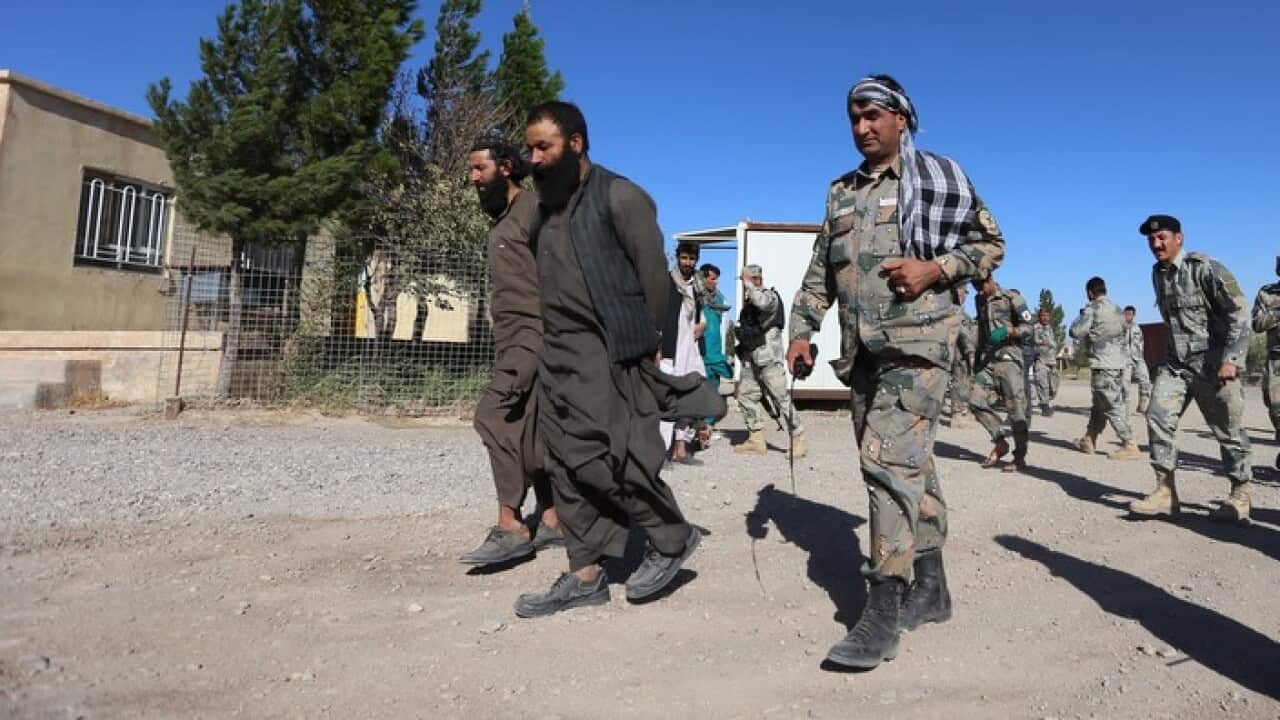The Kabul Garrison Command links the Afghan National Army, the police and intelligence services.
It's a relatively new concept for the Afghan security forces - a place where what they call the pillars of security talk to each other and plan.
“The KGC is responsible for the security of Kabul city and the people of Kabul,” Colonel Sayeed Amin Mosawi told SBS.
“[Since] the KGC was established in Kabul about two year ago, everything is going well, everything is really good and everything has changed. We're trying to do our best.”
It's Joint Operations Command room is the heart of the KGC. A large conference room filled with maps and monitors, it allows the KGC to monitor the capital 24/7. The capital city is one of the most dangerous in the world and the KGC deals with a steady stream of bombings, gunfights and vehicle attacks.
The capital city is one of the most dangerous in the world and the KGC deals with a steady stream of bombings, gunfights and vehicle attacks.

Major Nick Rutten observes a meeting in the KGC (SBS) Source: SBS News
"They're making coordination between the three pillars to provide the security and make decisions for the incident area,” Lieutenant Colonel Mohammad Shapoor Sharifyar said.
"To prepare the ambulance, to provide the security, to clear the areas.”
The Taliban and the Islamic State in Khorasan Province (IS-K) remain in constant conflict with the government.
“The enemy is all the time fighting against our government,” Colonel Amin said.
“It's really hard to understand, this enemy is a coward.” In its latest snapshot of Afghanistan, the UN mission in the country recorded 5,532 security incidents in the country between June and August, resulting in 1,662 deaths.
In its latest snapshot of Afghanistan, the UN mission in the country recorded 5,532 security incidents in the country between June and August, resulting in 1,662 deaths.

Lieutenant Colonel Sayeed Amin Mosawi (SBS) Source: SBS News
Of the 5,243 casualties recorded by the UN, 18 per cent were attributed to government forces.
“You're dealing with an incredibly complex security situation in a city of six million people and trying to solve that security situation with only 25,000 troops,” Australian Army Major Nick Rutten said.
Major Rutten, who works as a mentor for the Afghans at the KGC, says it's challenging to make them proactive about security. It's hardly surprising for a country that has been at war for four decades.
It's hardly surprising for a country that has been at war for four decades.

The KGC is the only Australian led and run mission in Afghanistan (SBS) Source: SBS News
“Something bad happens, they solve the problem, whereas our system is a little bit more predictive in the way we try and approach our operations,” Major Rutten said.
“We're trying get them to think about things three, six, twelve months in advance.”
The KGC had been operating for about a year when a massive truck bomb exploded near the diplomatic zone in Kabul in May.
Related reading

Australia and the training of Afghanistan's new officers
It killed more than 100 people.
“It’s a lot more tense. You can definitely tell that in the way members of KGC operate themselves,” Major Rutten said.
“There's a feeling in the air that that was a turning point in the way they conducted security in Kabul."
“They can't fight face to face,” Lieutenant Colonel Shapoor said when asked about the attack at the airport.
No insurgent group claimed responsibility for the attack but Afghanistan’s intelligence network suspected the Haqqani Network.
“They're cowards, they can't fight because we are stronger, so much stronger,” Lieutenant Colonel Shapoor said.
Apart from the obvious physical threats, the Australian contingent at the KGC is also helping it navigate the bureaucracies that are a part of military and diplomatic life.
“The biggest threat to KGC is them maintaining their position as the joint headquarters in Kabul,” Major Rutten said.
“Because of that nature in being very reactive to things, they don't see the need for a headquarters that plans in advance. Every day, they're fighting for legitimacy, they're fighting within their own government structure to ensure they have a seat at the table.”










